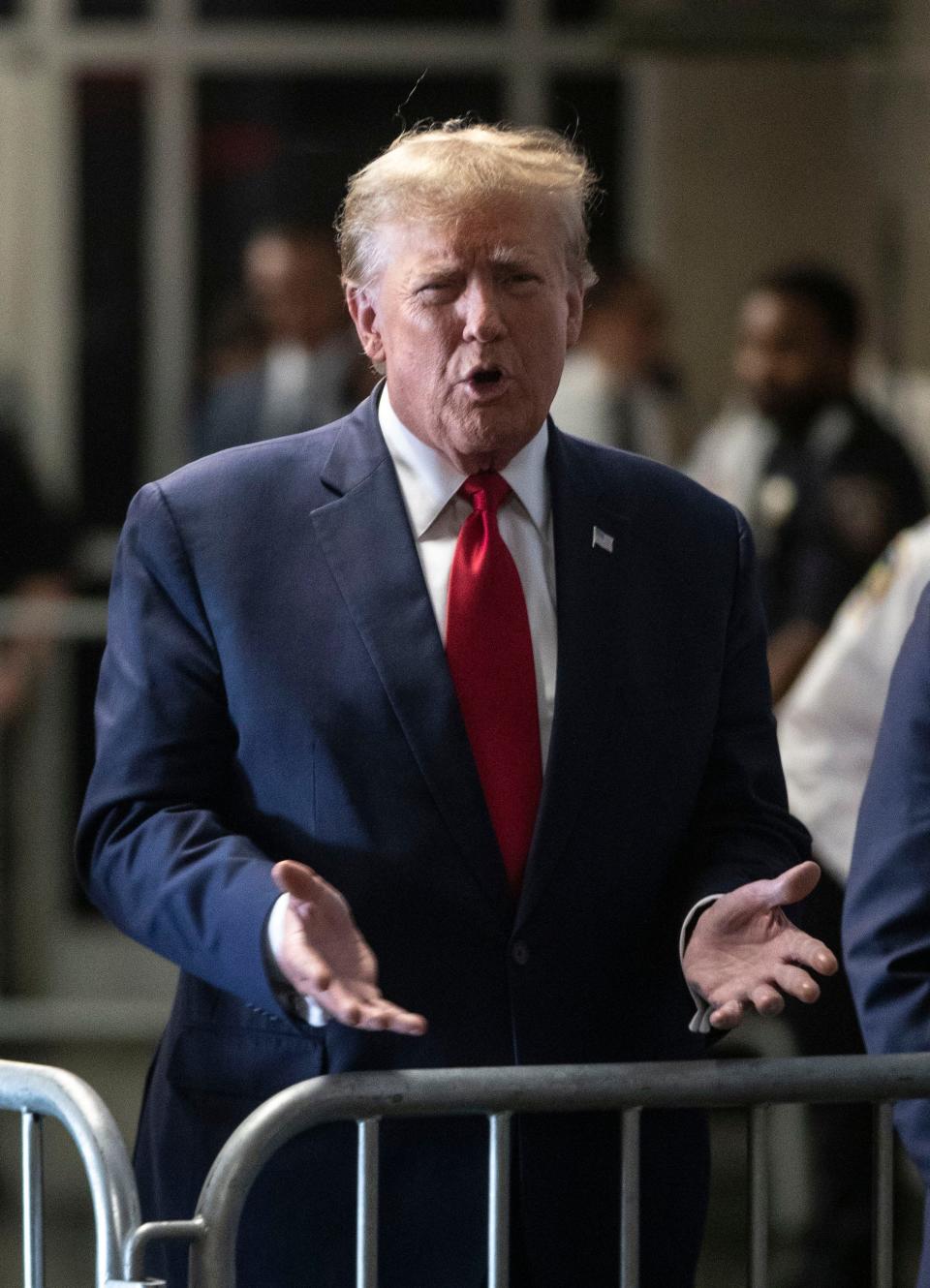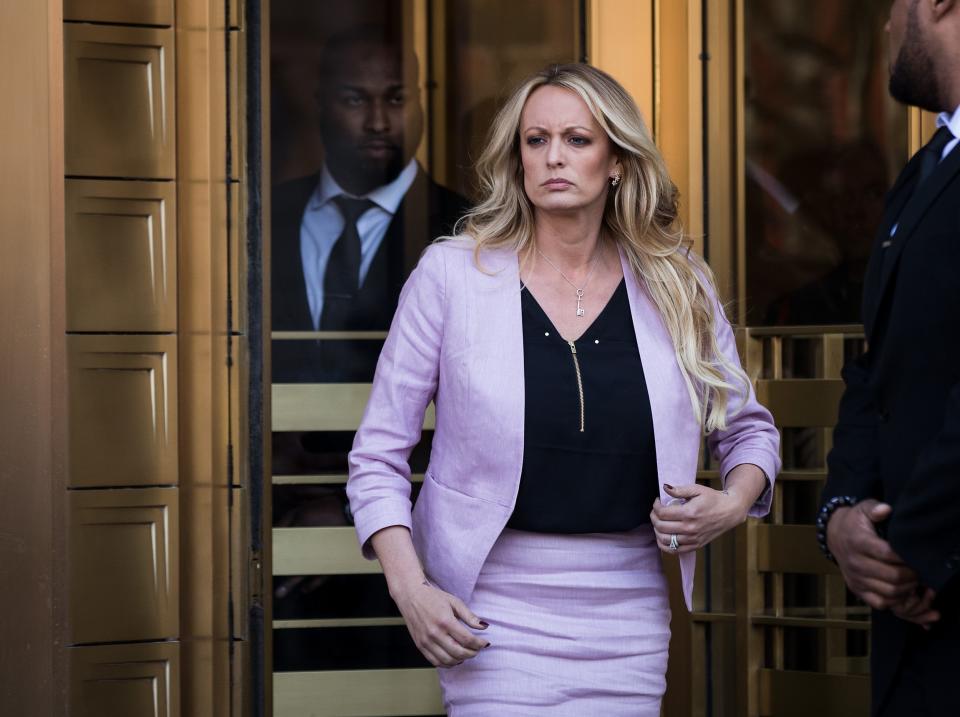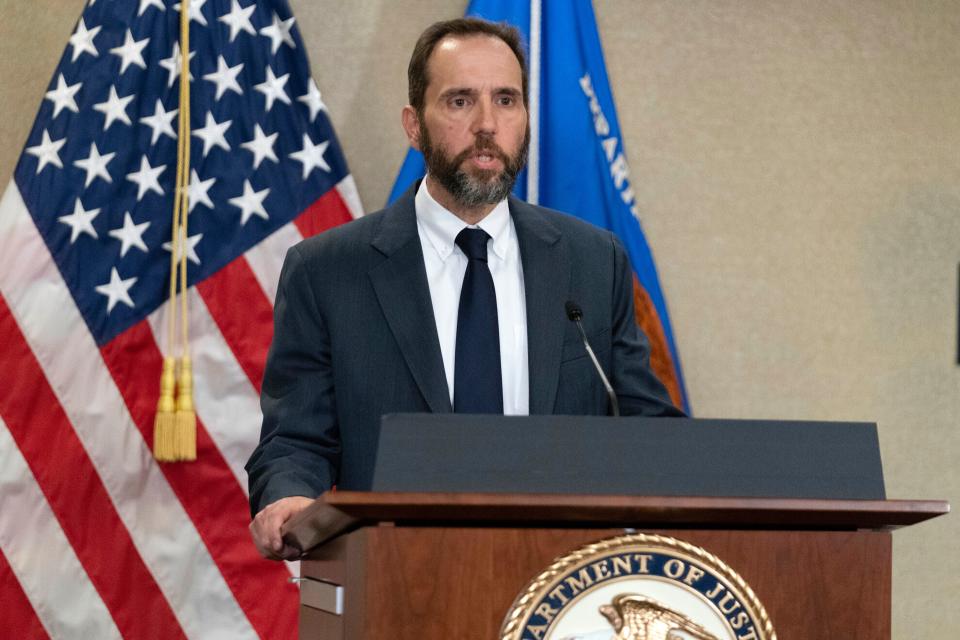Why Donald Trump is probably still going on trial March 25 in New York
Although the Supreme Court effectively delayed Donald Trump's federal election interference case on Wednesday by agreeing to hear his immunity appeal in late April, the former president is still poised to go on trial on March 25 in his New York criminal case.
Legal experts said they expect that date to hold, even if Trump tries to claim immunity in that case in the coming days. However, experts thought Trump might gain some delay over the immunity issue in his Florida federal case dealing with whether classified documents were illegally retained.
Trump's New York criminal case centers on whether he illegally falsified business records to cover up a hush money payment by his former lawyer, Michael Cohen, to adult film actress Stormy Daniels ahead of the 2016 presidential election.

In its Wednesday order agreeing to hear Trump's immunity argument in the federal election subversion case, the Supreme Court said it plans to address whether a former president is immune from prosecution "for conduct alleged to involve official acts during his tenure in office."
Trump legal team has argued he cannot be prosecuted for any crime committed as part of an official act as president, even ordering the assassination of a political rival, unless he was impeached and convicted by Congress.
"It would be hard for him to make the argument that ordering Michael Cohen to pay off Stormy Daniels is anything related to an official act of the president of the United States," said David Schultz, a visiting law professor at the University of Minnesota who teaches courses on election and constitutional law.
Cohen made the payment to Daniels ahead of the 2016 presidential election and was later reimbursed by Trump through payments whose purpose was disguised through false business records, according to prosecutors. Cohen later pleaded guilty to making an illegal campaign contribution through the payment.
How Trump could seek New York delay
As he has done in other cases, Trump could file a motion to dismiss the New York charges based on presidential immunity. For example, he could argue that immunity applies because — according to claims he has previously made — he hired Cohen in order to separate his business affairs and presidential duties, and the conduct he's charged with related to his position as president.
Trump might, at that time, ask the trial judge to suspend the case, perhaps pointing to the Supreme Court's anticipated ruling in his federal election case as something that could have bearing on whether he can be prosecuted in the New York criminal case.
Even if he has no realistic chance of succeeding with a presidential immunity argument, he may pursue the strategy in order to gain a delay that would push his trial past the presidential election in November.
If Trump wins the election, he could then argue it would be improper to hold a trial while he is the president-elect or, later, the president.
Still, whether or not Trump's argument has any chance of succeeding is something courts would take into account when deciding whether to delay a trial while an issue is appealed, Schultz said.
"It's pretty hard, I think, to make the argument that, again, this is an official act of the presidency, and therefore comes within any reasonable gamut of what the courts have already said about immunity," Schultz said.
New York: 'The path is so grim that he may not even try'
Norman Eisen, a Brookings Institution senior fellow and former special counsel to the House Judiciary Committee, agreed Trump will likely fail if he tries to delay the New York trial based on a presidential immunity argument. Eisen pointed to a July ruling from a federal judge over whether Trump could get the New York case moved to a federal court based on his argument that the case related to acts performed "under color" of his presidential office.

There, Judge Alvin Hellerstein concluded that Trump’s alleged conduct in the New York case “does not reflect in any way the color of the President’s official duties.”
"Hush money paid to an adult film star is not related to a President's official acts," Hellerstein wrote.
Trump initially filed an appeal, but later dropped it.
Eisen noted legal principles that prevent individuals from re-litigating issues that have already been decided, and from raising arguments that should have been raised earlier. Those principles don't mean Trump won't try to invoke immunity to seek delay, "but he will almost certainly fail if he does," Eisen said.
"In fact, the path is so grim that he may not even try, despite his usual predilection for never missing an opportunity to seek delay," Eisen said.
Florida: Judge 'may be tempted to apply immunity'
In Florida, where Trump is federally charged with illegally retaining documents and trying to obstruct justice, federal Judge Aileen Cannon chose not to set a trial date at a scheduling conference on Friday. Cannon expressed skepticism about the government's proposal to start July 8, but she didn't clarify when she will set a date.
Trump may have more of an opening to seek an immunity-related delay in that case, even if his immunity argument is a longer stretch than in his federal election case, experts said.
Trump advanced his immunity argument in Florida last month, asking federal Judge Aileen Cannon to dismiss the case.
Prosecutors say Trump retained hundreds of classified documents after he left office, and resisted turning them over in response to a grand jury subpoena. While presidential immunity would typically not cover acts after leaving office, Trump has argued that the charges turn on him deciding when he was president to designate the records as personal and have them removed from the White House.
"The alleged decision was an official act, and as such is subject to presidential immunity," Trump said in his filing.

Cannon hasn't yet ruled on the issue.
Schultz said the pause the Supreme Court has placed on the federal election interference case shouldn't affect the Florida federal trial because the alleged crime appears to be the retention of documents after Trump was no longer president. Whether Trump changed the status of the documents as president and therefore didn't commit a crime later is a question for a jury, Schultz said.
Still, the Florida federal court might fear proceeding only to realize later that the Supreme Court has issued a ruling on immunity that forces the lower court to backtrack, according to Schultz.
"I could see a federal judge saying, 'We're just going to wait a couple more months and let the Supreme Court clarify any issues here,'" Schultz said.
The particular judge in the case could also provide an edge for Trump in getting some delay, according to Eisen. He noted that Cannon was rebuked by the 11th Circuit Court of Appeals after she said that Trump's status as a former president supported temporarily blocking the government from using lawfully seized records in a criminal investigation.
The appeals court described the idea of a special exception for former presidents as defying the "foundational principle" that the law applies to everyone.
"She said in her earlier rulings that he deserves special treatment as a former president," Eisen said. "So she may be tempted to apply immunity."
Contributing: Hannah Phillips
This article originally appeared on USA TODAY: Could a Supreme Court Trump immunity case spell New York trial delay?
